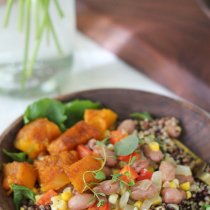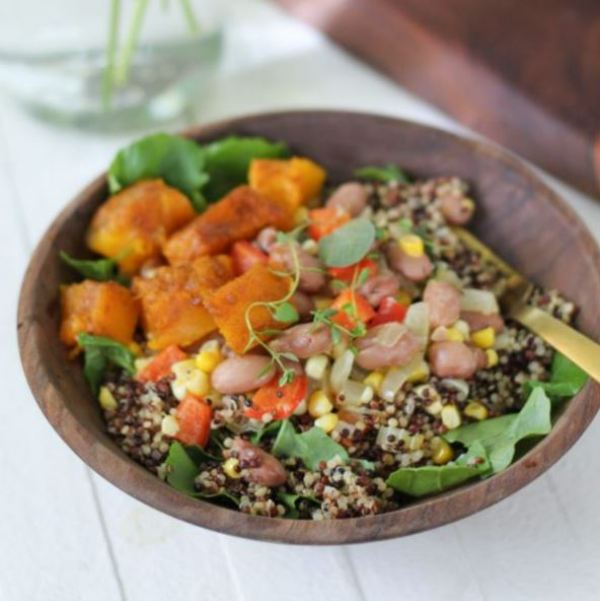Three Sisters Harvest Bowls
Ingredients:
For the squash:
2 C butternut, Seminole pumpkin or kabocha squash, peeled and cubed
pinch of salt
1 T balsamic vinegar (other vinegars will do)
1 T olive oil
For the beans and corn:
1-2 T olive oil
1 Vidalia onion, diced (other mild onion will do)
1-2 stalks celery, diced
1 red pepper, diced
2 T chopped fresh parsley (1 ½ tsp dried)
1 T chopped fresh sage leaves (1 ½ tsp dried)
1 tsp minced fresh rosemary leaves (1/3 tsp dried)
1 tsp fresh thyme leaves (1/3 tsp dried)
2 ears corn (about 1½ C)
1 1/2 C pre-cooked or canned beans
salt and pepper, to taste
Serve with: wild rice, quinoa, arugula, or kale
Directions:
- Preheat the oven to 425 degrees F.
- Toss the squash cubes with salt, vinegar, and olive oil. Spread on a baking sheet. Roast for 20-30 minutes, stirring every 10 minutes or so, until tender all the way through when you poke them with a fork.
- Meanwhile, sauté the onion in a large Dutch oven for a few minutes, stirring. Add celery. Cook until both are soft and translucent. Stir in the red pepper and herbs.
- Slice the corn off the cobs and stir into the pot. Gently fold in the beans. Simmer, and add salt and pepper to taste.
- Build your bowl with wild rice, quinoa, kale, and/or arugula as the base. Top with the corn and beans mixture and roasted squash. Garnish with some fresh herbs, as you like.
- Learn more about peeling, cubing and roasting squash here and learn more about how to substitute dried herbs with fresh here.
Story:
Indigenous People's Day this week (see below) invites us to explore native culture and foods. Native American languages do not use the pronoun "it" when referring to the natural world. "It" is for items made by human hands. Trees, animals, rocks and water are "he" or "she." How would humans treat the earth if we spoke of creation as brothers and sisters? If we saw in each creature the presence of the divine? Saint Francis of Assisi did as he prayed "Laudato Si'" or "Praised be the Lord through Sister Air." Would we listen to earth’s wisdom before imposing our ideas and consumer mentality on members of our family? How should we treat our relatives, the soil, plants and rivers? The ore and oil and gas deep in the earth?
The companion planting technique devised by indigenous farmers called "3 Sisters" is still practiced today. Planted in the same bed, corn provides a trellis for the beans, beans add nitrogen to the soil, and large squash leaves shade out the weeds around all three. This companion planting allows all three sisters and the whole community to thrive. Something for humans to imitate!
Columbus Day (October 12) acknowledged Christopher C. and other explorers who came to the western hemisphere in the 14 and 1500's. Indigenous People's Day (around October 12) is new in some communities to acknowledge and celebrate the original people who lived on land we now occupy, whole nations who were often displaced or destroyed along with their language, food ways, spirituality. We can work for justice. See: fspa.org We will explore more in November, during American Indian Heritage Month with recipes and stories. Share your favorite recipe for squash, wild rice, berries and cranberries!
If you would like to be notified when we share new recipes, be sure to scroll to the bottom, provide your email address, check the box confirming you are not a robot, click on a few photos to prove it and click subscribe! You will then receive an email after each new post. Remember, we're always looking for new recipes, so keep sending them to ecopact@fspa.org!






Post a Comment